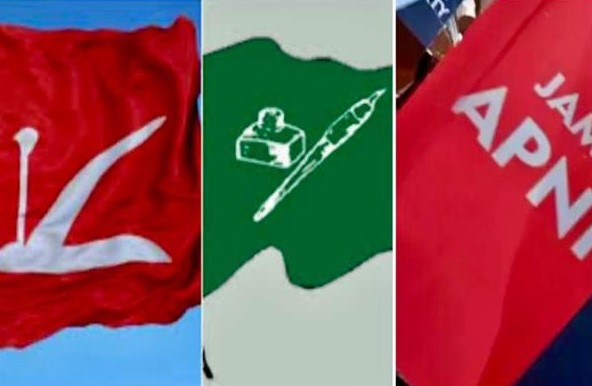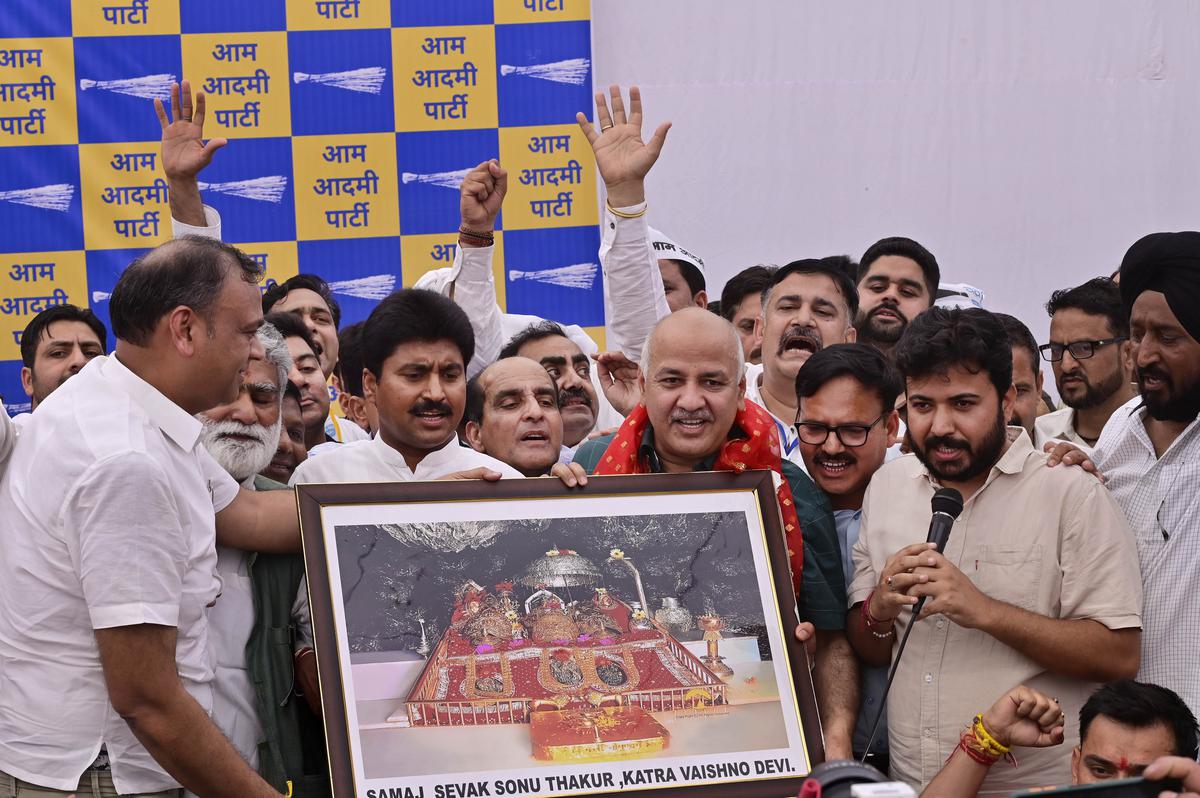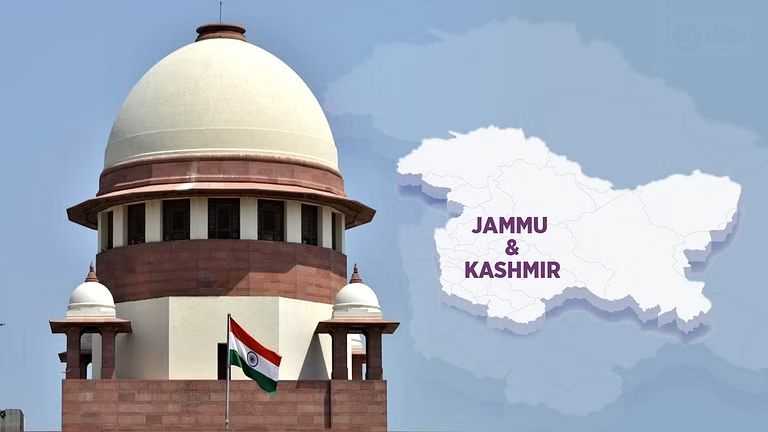War of Words Erupts Between PDP and Apni Party Over Omar Abdullah’s ‘No Alliance with BJP’ Remark
By: Javid Amin | 05 October 2025
A fresh political storm has gripped Jammu & Kashmir after National Conference (NC) vice president Omar Abdullah publicly reiterated that his party would “never ally with the BJP.” His remark triggered sharp counterattacks from both the People’s Democratic Party (PDP) and the Apni Party, reigniting long-standing tensions over credibility, political alliances, and ideological integrity in the Valley.
Omar Abdullah Reiterates: “Never Join Hands with BJP”
Speaking at a youth convention in Budgam on Sunday, Omar Abdullah made a forceful declaration aimed at reaffirming NC’s ideological distance from the ruling party at the Centre.
“Let me make it clear once again—we will never join hands with the BJP. Our politics is rooted in the aspirations of the people of Jammu & Kashmir, not in opportunism,” Omar said.
The statement was widely interpreted as both an assurance to NC’s traditional voter base and a veiled dig at regional rivals who have either collaborated with, or remained strategically neutral toward, the BJP-led central government.
Political analysts suggest that Omar’s remarks are part of a broader attempt to consolidate anti-BJP sentiment ahead of the long-awaited assembly elections in Jammu & Kashmir, expected sometime in 2025–26.
PDP’s Counterattack: “Selective Memory Won’t Erase History”
The PDP, led by Mehbooba Mufti, wasted no time in countering Omar’s remarks. In a statement, PDP spokesperson Mohit Bukhari accused the NC of political hypocrisy and “revisionist history.”
“Omar Abdullah should first explain his party’s role in the 1999 NDA government and its silence post-August 5, 2019. This holier-than-thou attitude won’t erase history,” Bukhari said.
The PDP has consistently claimed that its alliance with the BJP in 2015 was a “compulsion of governance” designed to bridge the gap between Srinagar and New Delhi, not a permanent ideological shift. After the abrogation of Article 370 and 35A in 2019, the party distanced itself sharply from the BJP, often accusing it of undermining Jammu & Kashmir’s constitutional identity and autonomy.
PDP insiders view Omar’s statement as a bid to “whitewash” NC’s own history of cooperation with Delhi, particularly during periods when Farooq Abdullah and Omar himself held power in alliance with national parties.
Apni Party Joins the Fray: “We Don’t Do Theatrics”
Adding another layer to the unfolding drama, Apni Party leaders hit back at both NC and PDP, accusing them of double standards and political opportunism.
“Both NC and PDP have had their share of alliances with the BJP. We don’t indulge in theatrics—we focus on development,” said Rafi Ahmad Mir, a senior leader of the Apni Party.
Founded in 2020 by Altaf Bukhari, the Apni Party emerged from the post-Article 370 political vacuum. The party positions itself as a “pragmatic alternative”, emphasizing engagement with the Centre as a means to secure economic and developmental benefits for the people of Jammu & Kashmir.
According to political observers, the Apni Party’s response underscores its effort to project stability and administrative competence, especially among voters weary of ideological battles and prolonged uncertainty.
The Political Context: Pre-Election Realignments
The verbal crossfire between the three major regional forces comes at a critical juncture. With assembly elections likely on the horizon, parties are recalibrating their messaging to appeal to a politically fatigued electorate.
-
The National Conference is positioning itself as the guardian of J&K’s political identity and constitutional rights.
-
The PDP seeks to reclaim its lost moral ground by highlighting its “sacrifices” post-2019.
-
The Apni Party focuses on governance, jobs, and development, distancing itself from what it calls “the politics of sentiment.”
Analyst Dr. Sheikh Imran, a Srinagar-based political commentator, notes that Omar Abdullah’s statement may be a strategic prelude to electoral mobilization:
“This isn’t just about ideology—it’s about narrative control. Omar wants to remind voters that NC remains the natural home for those opposed to the BJP. But the PDP and Apni Party are equally determined to puncture that moral superiority.”
Ground Reactions: Praise, Skepticism, and Fatigue
Reactions among the public have been mixed, reflecting the region’s broader political disillusionment.
In Srinagar and Budgam, some hailed Omar’s comments as a reaffirmation of “core Kashmiri identity politics.” “He’s speaking what many people feel—that local leadership must stay independent,” said a local shopkeeper in Lal Chowk.
Others, especially younger voters, voiced skepticism. “We need jobs, not jibes,” tweeted @Aqib_Anantnag, a college student. “All parties have danced with Delhi at some point. Who’s clean?”
In Baramulla and Kulgam, there was frustration over the lack of tangible governance outcomes. “These statements come every election season,” said Shazia Bano, a school teacher. “But where is the roadmap for education, employment, and peace?”
Meanwhile, some traders in Sopore and Pulwama welcomed the Apni Party’s focus on development. “People are tired of endless slogans. We want roads, power, and business support,” said Abdul Majid, a fruit exporter.
The Ideological Tug-of-War
At the heart of this exchange lies the unresolved question: Can any regional party in Jammu & Kashmir afford to remain completely detached from Delhi’s power structure?
Historically, all major J&K parties—NC, PDP, and others—have, at various times, collaborated with the Centre. Yet, each tries to frame that engagement differently:
-
For the NC, it was “to protect J&K’s special status within the Union.”
-
For the PDP, it was “to bridge the divide.”
-
For the Apni Party, it’s “to deliver governance.”
But post-2019, when Article 370 was revoked, political legitimacy in Kashmir became deeply tied to how strongly a party positions itself vis-à-vis the BJP.
Omar Abdullah’s reaffirmation thus serves both as a moral declaration and a strategic necessity, designed to cement NC’s claim as the primary custodian of J&K’s political dignity.
Expert Take: “The Contest Is for Credibility”
Political expert Zafar Shah notes that while rhetoric may dominate headlines, credibility will decide ballots.
“The electorate in J&K is mature and politically aware. They’ve seen alliances, breakups, and betrayals. What they want now is consistency and delivery. Omar’s statement will resonate only if NC presents a concrete developmental vision alongside its ideological stance.”
He adds that the PDP’s aggressive pushback may be an attempt to reclaim relevance after years of organizational setbacks, while the Apni Party continues to position itself as a technocratic, post-ideological alternative.
Bottom-Line: Rhetoric Meets Reality
As Jammu & Kashmir inches closer to electoral revival, this war of words between the NC, PDP, and Apni Party exposes the fragile balance between ideology, pragmatism, and public trust.
Omar Abdullah’s “no alliance with BJP” remark may have reignited the political debate—but for voters, the real question remains unchanged:
Who can deliver stability, jobs, and dignity in a post-Article 370 landscape?
For now, Kashmir’s political stage is alive once again—with old rivals, familiar scripts, and a new audience eager to see who truly means what they say.



